Intelligence
Can the beauty queen make a batter pudding?
1950: E.W. Wyer, a councillor in Hunstanton (Norfolk), proposed that beauty contests should focus on brains as well as beauty. He suggested:
London Daily Mirror - Oct 18, 1950
Posted By: Alex - Fri Jan 03, 2025 -
Comments (1)
Category: Awards, Prizes, Competitions and Contests, Intelligence, Gender, 1950s
The National College Queen
This contest for top female college student ("fifty percent beauty, fifty percent brains") appears to have begun in 1953: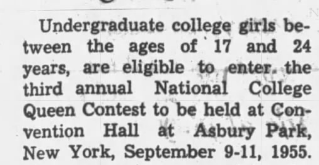
Source: ETSU Collegian (Johnson City, Tennessee) 01 Apr 1955, Fri Page 5
The first photo below is from 1969, and I can't envision the contest surviving much beyond that revolutionary date.

Source: The Aggielite (Tishomingo, Oklahoma) 15 Mar 1955, Tue Page 1

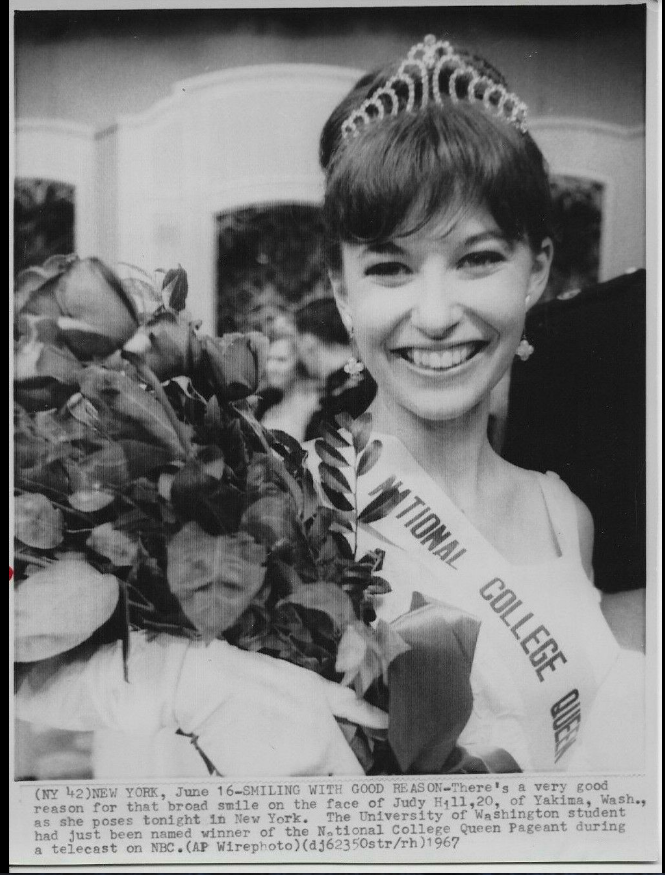
It was once so popular, it was televised nationwide.
Source: The Kingston Daily Freeman (Kingston, New York) 10 Jun 1967, Sat Page 16
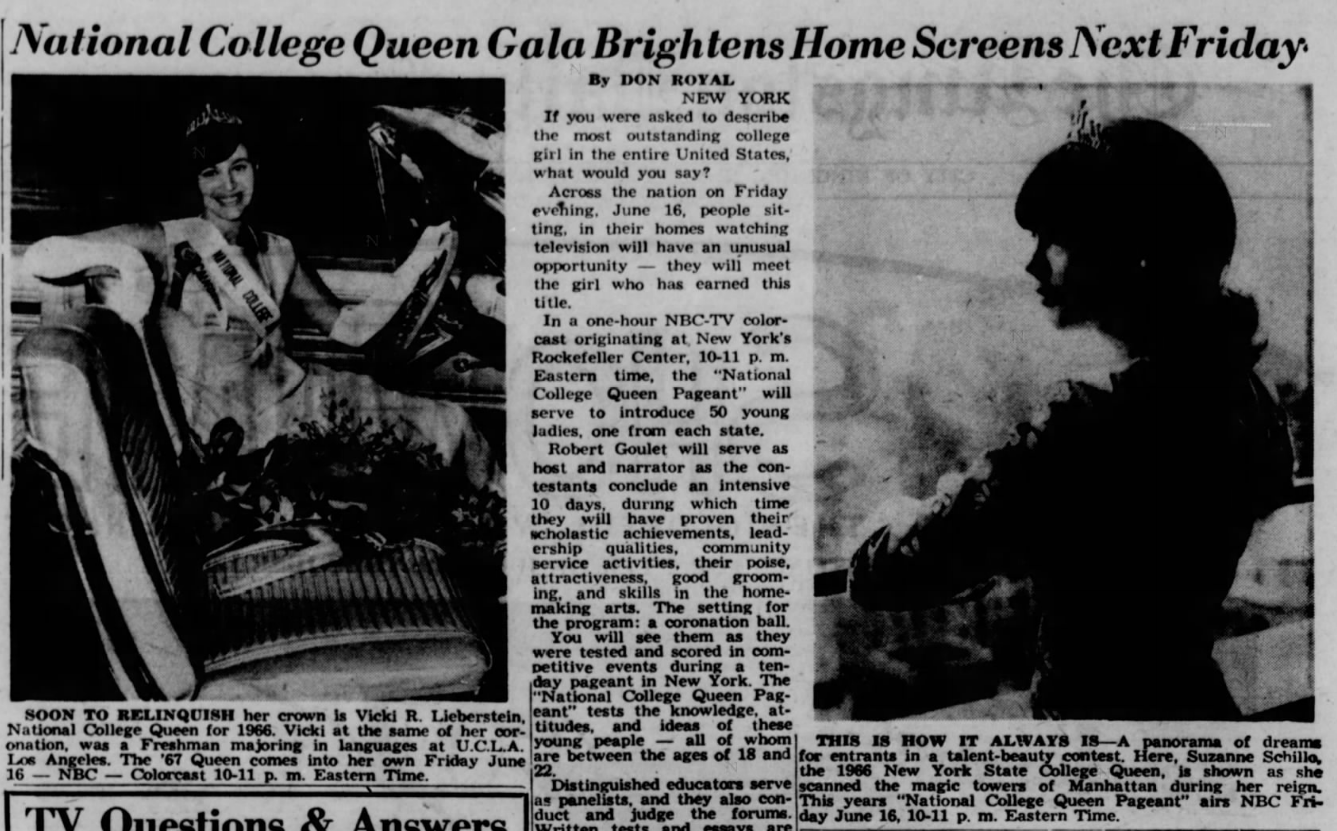

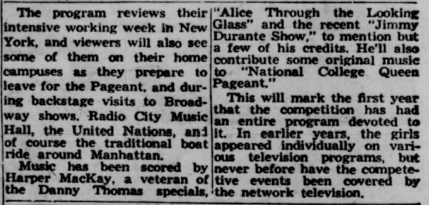
Posted By: Paul - Fri Sep 23, 2022 -
Comments (3)
Category: Awards, Prizes, Competitions and Contests, Beauty, Ugliness and Other Aesthetic Issues, Intelligence, Television, 1950s, 1960s
Follies of the Madmen #514
A face to inspire confidence?The source.
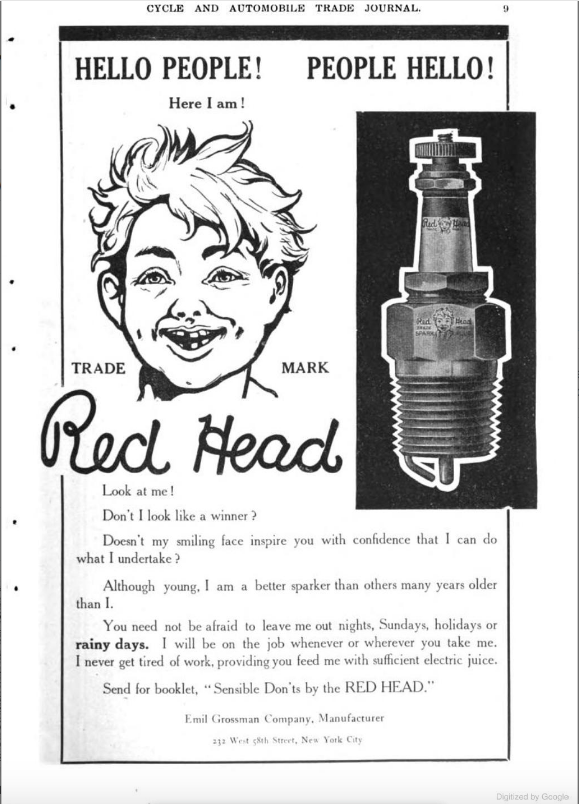
Posted By: Paul - Mon Aug 30, 2021 -
Comments (1)
Category: Business, Advertising, Intelligence, Motor Vehicles, 1900s
How to raise a genius
According to Harold G. McCurdy, a professor at the University of North Carolina, the first step was to not send your kids to public school.Not that he had anything against public schools, having sent his own kids to one. And he questioned whether raising kids to be geniuses was a desireable goal, since he believed that geniuses often led isolated, unhappy lives.
Nevertheless, based on his study of the childhoods of 29 geniuses, conducted back in 1960, he determined that "three striking factors seemed to be typical of the childhood pattern of genius":
"Public school education," he declared, "works against these three things."
Apparently McCurdy's study has been embraced by some proponents of home schooling. Although I don't get the sense that it was his intention to promote that.
You can read McCurdy's full study here: The Childhood Pattern of Genius
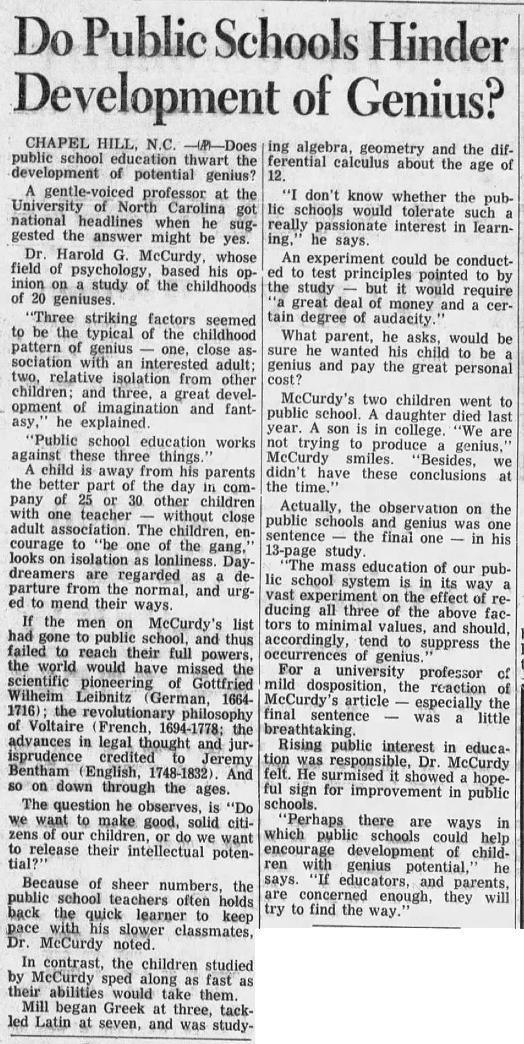
The Oklahoma Daily - Feb 17, 1961
Posted By: Alex - Thu Oct 15, 2020 -
Comments (5)
Category: Education, Intelligence, School, 1960s
The Draft and Army IQ
Following up on Chuck's mention of "military intelligence" in his latest column, this short article from 1951 noted the (perhaps unexpected) effect that a military draft has on the average IQ of GIs.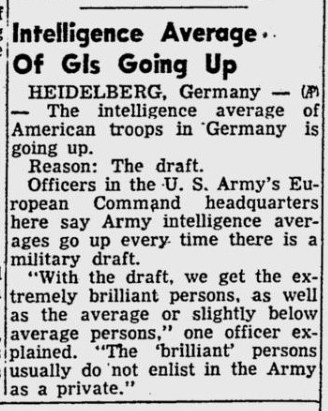
St. Petersburg Times - Oct 13, 1951
HEIDELBERG, Germany — The intelligence average of American troops in Germany is going up.
Reason: The draft.
Officers in the U.S. Army's European Command headquarters here say Army intelligence averages go up every time there is a military draft.
"With the draft, we get the extremely brilliant persons, as well as the average or slightly below average persons," one officer explained. "The 'brilliant' persons usually do not enlist in the Army as a private."
Posted By: Alex - Thu Feb 25, 2016 -
Comments (10)
Category: Intelligence, Military, 1950s
Reverse Fishing
Watch the Killer Whale lure a bird in with a well placed fish and score a non fish dinner for himself.
Posted By: Alex - Sun Aug 30, 2015 -
Comments (3)
Category: Intelligence, Fish, Eating
Mayo Buckner, the man who was sane
Back in 1890, when Darthula Buckner was pregnant with her son Mayo, she saw a blind piano player named Blind Boone perform. She found it frightening the way Blind Boone rolled his eyes, and she grew to believe that somehow Blind Boone had imprinted his influence on the child inside her. Because as Mayo was growing up, sometimes he too rolled his eyes. Mayo was also a bit shy, and he ate his food fast. This was too much for his mother, who decided he needed "special management" and took him, at the age of 8, to the Iowa Home for Feeble-Minded Children.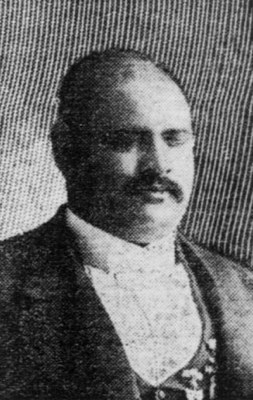
Blind Boone
An official at the institute (but not a doctor) took one look at Mayo and declared he was a "medium-grade imbecile." And so began Mayo's new life as an inmate in a mental institute.
When he reached adulthood, Mayo frequently told the doctors that he felt he was perfectly sane and would like to leave. But this request was always denied. And since he was so often told he was feeble-minded, he eventually came to believe it.
Until a new superintendent arrived at the school, tested Mayo, and told him that not only was he perfectly sane, but he also had a higher-than-average IQ of 120. So he was free to leave.
But by that time it was 1957 and Mayo was 67 years old. He had nowhere to go, so he decided to stay. He died there in 1965.
Read more about the strange life of Mayo Buckner in this Life magazine article from Mar 24, 1958.
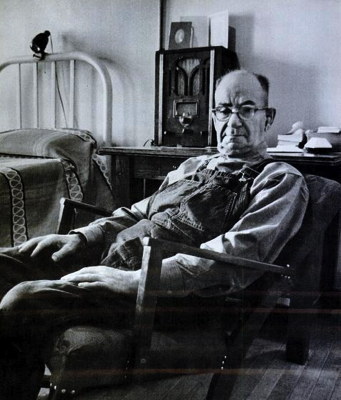
Mayo Buckner
Posted By: Alex - Wed Feb 20, 2013 -
Comments (6)
Category: Hospitals, Intelligence

| Who We Are |
|---|
| Alex Boese Alex is the creator and curator of the Museum of Hoaxes. He's also the author of various weird, non-fiction, science-themed books such as Elephants on Acid and Psychedelic Apes. Paul Di Filippo Paul has been paid to put weird ideas into fictional form for over thirty years, in his career as a noted science fiction writer. He has recently begun blogging on many curious topics with three fellow writers at The Inferior 4+1. Contact Us |




